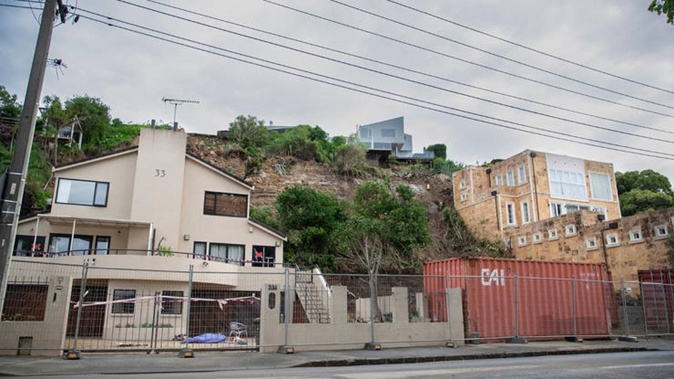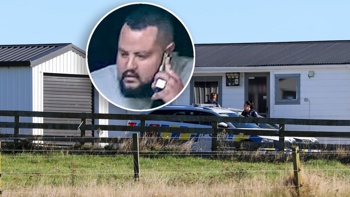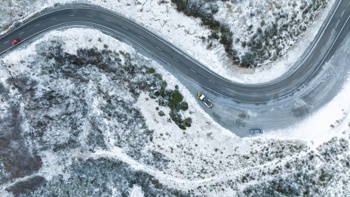
The reputation of cliff-top real estate in Auckland took a knock in 2023, with the stability and value of high-profile homes in the city thrown into question after storms at the start of the year.
The scars left by the January floods can still be seen in parts of Remuera, Parnell and Hillsborough, while the damage caused by Cyclone Gabrielle just weeks later still haunts Muriwai in the city’s western fringe.
Lives were lost and broken in the extreme weather events, and even now, almost a year later, people are unable to return to their homes.
In Remuera and Parnell, many homes, some worth big money, were hit with red and yellow stickers.
Agents at the time said the storms had scuppered several sales that had yet to settle, and warned that buyers were likely to think twice about cliff-top properties.
“I think a lot of people now that would have just potentially gone and bought cliff-top, are now going to have a very serious think about it, no question,” one told OneRoof.
In West Auckland’s beach suburbs, agents were cautious about the future of the housing market. Several told OneRoof that buyers were treating Muriwai and Piha with caution, with transactions in both locations significantly down on the year before.
Bayleys agent Simon Spiller, whose Muriwai home was among the dozens that were red stickered in the aftermath of February’s deadly storm, told OneRoof in September: “Since the cyclone, we have only had four sales in the whole of Muriwai. Buyers are now questioning whether it’s the right decision to buy.”
Properties that would normally attract significant buyer interest and sell for a great price are struggling in the current market.
“In my 30 years in real estate I’ve never experienced anything like this,” he said.
Spiller said buyers were still attending open homes, but in smaller numbers and with different expectations.
“They’re saying the community doesn’t feel the same. We’ve still got the beach, the gannets, the golf course, and all that lovely, natural stuff, which is untouched. But [Muriwai] has this cloud of grief hanging over it.”
AUT professor in the School of Future Environments John Tookey said the extreme damage at Muriwai and other west coast beaches was due to the “relatively weak, porous rock” in the area. The escarpment rock at Muriwai, in particular, became unstable because of deep moisture penetration, and started to break up.
“Back in the late 1960s, substantial slips took place. It was viewed then as being sub-optimal to build. Then gradually, over time, memories fade,” he said.
“It is going to be an extended period of time until the ground stabilises sufficiently in the worst affected zones.”
/cloudfront-ap-southeast-2.images.arcpublishing.com/nzme/XSTO3UVPUJAYBNWG7RS4VJDKZE.jpg) Landslides in Muriwai, caused by Cyclone Gabrielle, have ripped the beach suburb apart. Photo / George Heard
Landslides in Muriwai, caused by Cyclone Gabrielle, have ripped the beach suburb apart. Photo / George Heard
Weather events had added an extra hurdle for buyers, the west coast agent said.
“There might be some additional steps in the due diligence process for potential buyers,” he said.
“Certain banks are now requesting building reports and geotechnical assessments, while insurance companies are seeking further [information] regarding land stability. All these are factors which will now affect the Piha/Karekare market.”
Wayne Shum, senior research analyst at OneRoof’s data partner Valocity, said that while sales of cliff-top homes were still being done in 2023, buyers had pulled back. Some of that was the result of the market-wide slump, but he had noted buyers were ordering geotechnical reports for homes they would have previously bought sight unseen.
“This is similar to the issues we had 20 years ago during the leaky homes crisis when anything plaster would attract negative attention.”
Nervous vendors back then would often commission moisture reports in anticipation of questions from potential buyers.
Similar doubts and question surround Auckland’s cliff-top homes.
“If you were a potential buyer, you’d be thinking, ‘What’s my cost?’ and ‘What’s my contingency?’. You’d also be worrying about insurance,” he said.
/cloudfront-ap-southeast-2.images.arcpublishing.com/nzme/6RNH62Q7VNCW5CP5EJBMRYGWYU.JPG)
“Cliff-top sellers will have to give buyers longer for a due diligence period, because you can’t get a geotech report done in a week, or build a seawall.”
Homes that suffered damage could be in limbo for years, said Shum. It could take a few years for EQC claims to be settled and owners move on.
“EQC claims are not like car insurance that settles in a week or two. While you’re doing that, you probably can’t sell it.”
Shum cited an example on Clovelly Road, in Bucklands Beach, which had a catastrophic cliff collapse in a 2017 weather event. The home had a rateable value of $1.8m in April 2013. The property sold in August 2020 for $455,000 and the 2021 CV was $475,000. By November of that year, the home was being demolished.
Some cliff-top homes that sold this year had reached or exceeded their 2021 CVs. Others sold for less. But there could be many reasons for that, said Shum.
He cited the sale of a large spread on Beach Road, in Castor Bay, which had a $12.23m CV in 2021 and sold for $9.5m in May. The CV on the 5264sqm property would have included a premium for development potential, said Shum. “It’s got decent size land. So it would have some development potential built into the CV back then. That might have gone away a little bit now. The market is less development friendly than it was back in 2021.”
Barfoot and Thompson agent Paul Neshausen, who sold a modern cliff-top home on Riddell Road, in Glendowie, for $6.2m in July, said demand for such properties was still high but he agreed buyers were slightly more cautious than before.
“A potential vendor needs to front up now with a geotech report before they go to market. It’s almost a prerequisite depending on what cliff type it’s on. If you’re a couple of metres above the sea line, then no issue. But if you are on a decent cliff, you need your ducks in a row to allay any fears from purchasers.”
Buyers, for their part, needed to figure out the stability of the land, what remedial work, if any, would be required, and how much that would cost, said Neshausen.
“In general now, there is more awareness that there is more due diligence required on a cliff-top property before splashing out several million.”
- NZ Herald
Take your Radio, Podcasts and Music with you









